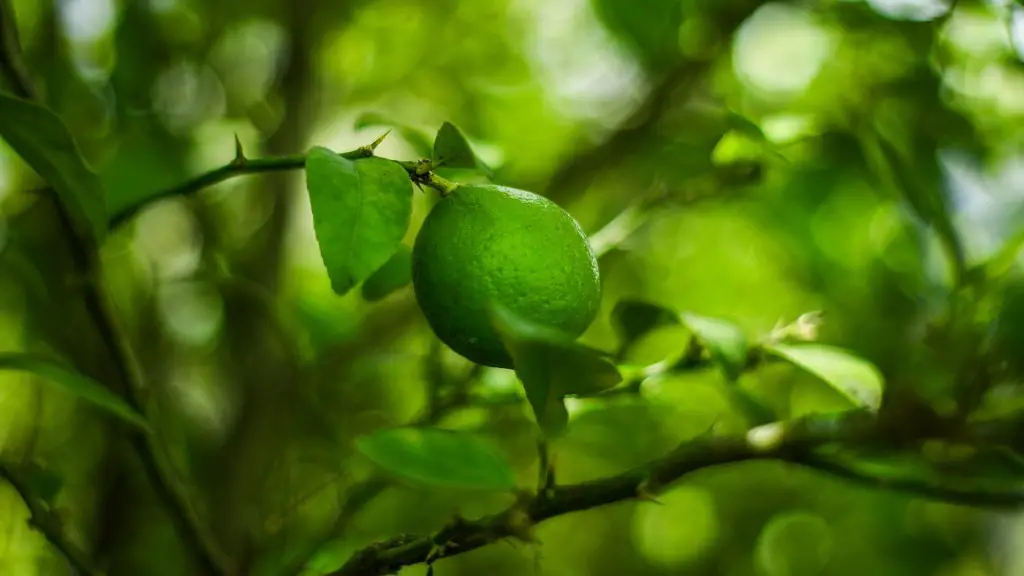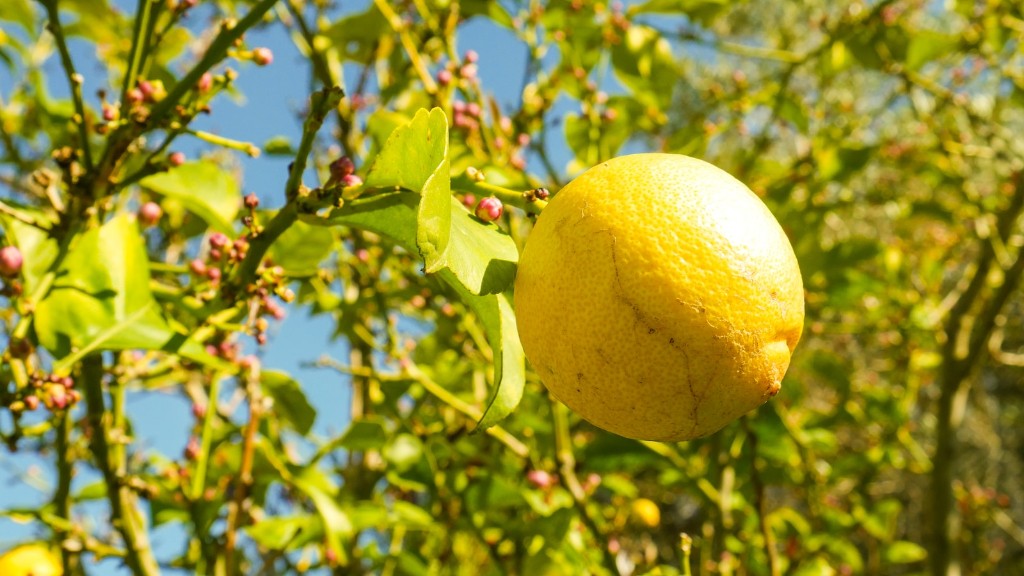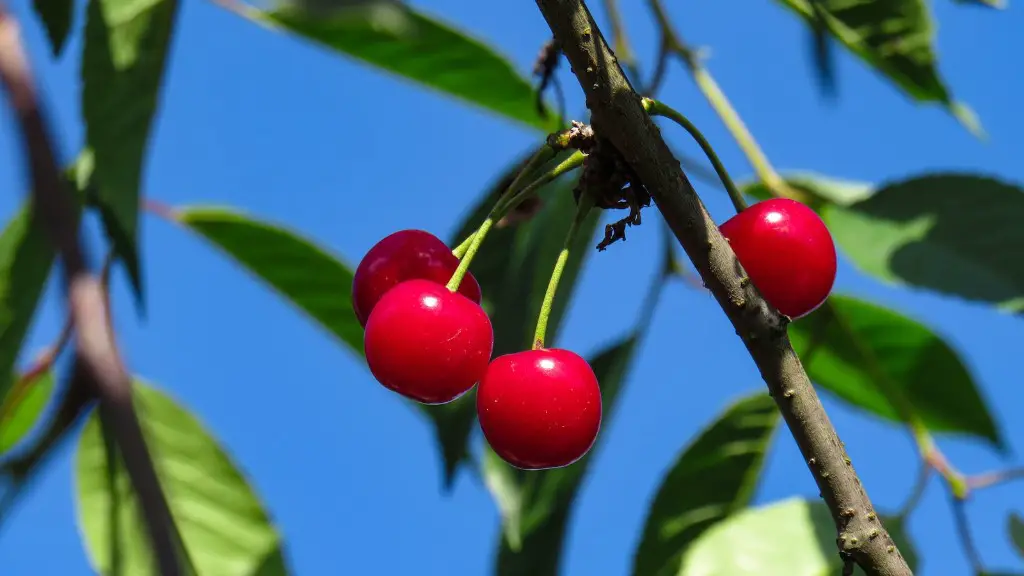Lemon trees are one of the most popular fruit trees in home orchards. Although commonly grown, there can be issues when it comes time to harvest the fruit. A common issue is why won’t my lemon tree grow lemons? There can be several possible reasons and solutions to this problem.
Firstly, the soil that the lemon tree is growing in might not be right for it. Lemons prefer a soil that is slightly acidic and well drained. Many soils found in gardens and suburban environments are not suitable for lemon trees, so it is advisable to consider adding additional soil amendments to get the pH balance right for optimal growth. Additionally, if the soil is too compacted or boggy, there is a possibility of inadequate drainage and oxygen availability.
Secondly, lemon trees may not produce fruit due to the age of the tree. Lemon trees need to mature to a certain age before they will flower and produce fruit. It is generally the case that a lemon tree does not bear fruit until it is about five years old. It is advisable to wait for the tree to reach this age before expecting significant fruit production.
Thirdly, inadequate fertilization can be a major reason why lemon trees do not produce fruit. To ensure that the lemon tree has all the necessary nutrients, it is important to feed the tree with a balanced fertilizer that contains nitrogen, phosphorus and potassium. Additionally, it is important to ensure that the tree is receiving the required amount of sunlight.
Fourthly, it is possible that there is inadequate pollination happening in the lemon tree. To increase the chances of pollination, it is advisable to grow several different varieties of lemon trees in the same area, as cross-pollination will vastly increase the likelihood of successful fruit production. Additionally, hand-pollinating can help to hasten fruit production.
Lack Of Water
One of the major reasons why lemon trees do not bear fruit is due to an inadequate amount of water. Lemon trees require plenty of water throughout the growing season to keep the soil moist and healthy. It is advisable to water the tree deeply every ten days or so during the hot summer months, and be sure to use mulch or peat moss around the base of the tree to retain moisture.
It is also important to ensure that lemons are not over-watered. If the soil becomes overly saturated with water, then the roots of the tree can become waterlogged, which can lead to root rot and reduced productivity. So, it is important to find a good balance of water and moisture for the lemon tree.
Additionally, water-soluble fertilizers can be used in conjunction with regular watering sessions to ensure that the tree is receiving the necessary nutrients. These fertilizers can be more immediately accessible to the tree’s roots, which can increase the chances of the tree bearing fruit.
It is also important to note that lemon trees require significant amounts of water during the flowering and fruiting process, so it is important to monitor the soil moisture carefully during these periods to ensure that the tree is getting the water it needs.
Temperature and Humidity
Lemon trees prefer a mild climate with temperatures of no higher than 95 degrees Fahrenheit during the day and no lower than 40 degrees Fahrenheit during the night. Lemon trees are usually grown in warmer climates, so it is important to ensure that the tree is kept in the shade during the hotter parts of the day. Additionally, it is important to make sure that the tree is kept out of windy locations as well.
The humidity around the tree is also an important factor for lemon tree growth. Lemon trees need a humid environment (80-90% is ideal) to thrive, so misting the tree with water is necessary during periods of too-low humidity. Alternatively, using a humidifier around the tree can help to keep the humidity at an adequate level.
Finally, it is crucial to note that lemon trees should not be exposed to prolonged periods of cold weather that is below 40 degrees Fahrenheit. If the lemon tree is exposed to prolonged cold spells, then the overall growth of the tree can be affected and the tree may not produce fruit.
Correct Pruning
Pruning is an important part of lemon tree maintenance, as it helps to shape the size and overall form of the tree. Pruning encourages new growth, and it helps to ensure that the tree produces an ample amount of fruit. It is important to prune the tree in late winter to early spring and avoid pruning during late summer to early fall, as pruning during this time can lead to reduced flowering in the next season.
Additionally, it is important to prune without disrupting the overall shape of the tree. It is advisable to selectively remove branches that are growing in the wrong direction or are crossing one another. Pruning should also be done in such a way that the tree does not become completely overcrowded. Over-pruning can lead to reduced productivity, so it is important to prune only when it is absolutely necessary.
Finally, it is important to be careful not to damage the trunk or main branches of the lemon tree. If the trunk is damaged, then it can lead to a number of issues including infection and reduced productivity.
Pest And Disease Control
Pests and diseases can be a major issue when it comes to lemon tree production. It is important to inspect the tree regularly to identify any signs of pests or diseases. If pests or diseases are identified, then it is advisable to take appropriate measures to eradicate them quickly in order to maintain the tree’s health.
It is also important to monitor for any signs of fungal infections. Fungal infections can be caused by too much wetness and humidity in the soil, so it is important to ensure that the tree is not over-watered and is kept in an ideal environment at all times.
Finally, it is advisable to use natural pest repellents around the tree to ward off any pests. Natural repellents such as neem oil or garlic can be effective at deterring pests, and they can also help to boost the overall health of the tree.
Nocturnal Animals
Nocturnal animals can also be an issue when it comes to lemon tree production. It is important to invest in a secure fence around the tree to ensure that animals such as skunks, racoons, and possums are kept away from the tree. Additionally, it is important to ensure that any fallen lemons are removed from the tree promptly in order to prevent these animals from being attracted to the tree.
It is also important to note that birds can be an issue when it comes to lemons. Birds will often consume lemons before they are ripe, so it is important to consider protective netting around the tree if there is a serious problem with birds invading the area. Additionally, it is advisable to hang bird deterrents such as wind-chimes or CD’s around the tree to scare away the birds.
Finally, it is important to keep the area around the lemon tree free of debris, as this can attract rodents and other animals. Rodents can cause a variety of issues, including the destruction of the tree’s roots and fruit.



